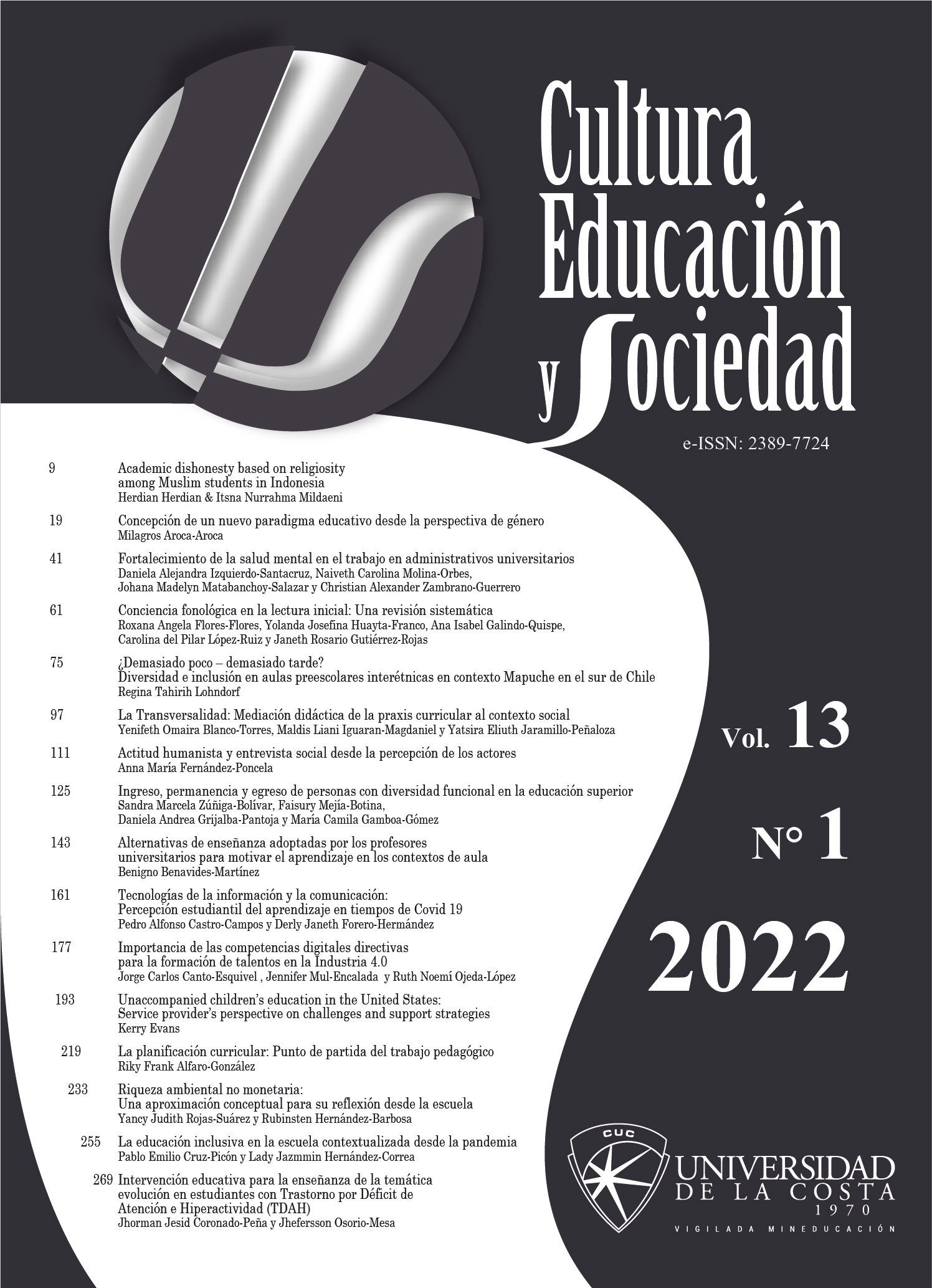Humanistic attitude and social interview from the perception of the actors
DOI:
https://doi.org/10.17981/cultedusoc.13.1.2022.07Keywords:
Acceptance, Authenticity, Empathy, Humanism, InterviewAbstract
Introduction: This text is an approach to the interview experience of the interview as a technique of applied social research and development of humanistic attitudes. Objective: Reflect on this technique, with special emphasis, not so much on the methodological aspect and the learning of it as such, as not its relational, human and social aspect. Methodology: For this, the opinion of a group of university students training in social research is considered, and to complement the testimony of people interviewed is also presented. Thus, there is a broad approach to the experience of the applying interviews, since interviewers and interviewees contribute their perception and assessment, although the analysis resolves around the attitudes of the person applying the interview. Results and discussion: Among the results stands out the humanistic attitude of the interviewers in general and the positive assessment in this regard according to the interviewed. Conclusions: Say that authenticity, listening, acceptance, empathy, trust, comfort, and even gratitude is observed.Downloads
References
Barceló, T. (2012). Las actitudes básicas rogerianas en la entrevista de relación de ayuda. Misceléa Comillas, 70(36), 123–160. Disponible en https://revistas.comillas.edu/index.php/miscelaneacomillas/article/view/722
Bhabha, H. (2002). El lugar de la cultura. Buenos Aires: Manantial.
Buber, M. (2008). Yo y tu. Buenos Aires: Nueva Visión.
Cannell, C. F. y Kahn, R. L. (1987). La reunión de datos mediante entrevistas. En, L. Festinger y D. Katz (Comps.), Los métodos de investigación en ciencias sociales. México, D.F.: Paidós.
Corona, S. (2012). Notas para construir metodologías horizontales. En, S. Corona y O. Kaltmeier (Coords.), En diálogo. Metodologías horizontales en Ciencias Sociales y Culturales. Barcelona: Gedisa.
Fernández, A. M. (2011). Antropología de las emociones y teoría de los sentimientos. Versión, 26, 1–24. Disponible en https://versionojs.xoc.uam.mx/index.php/version/article/view/416
Fernández, A. M. (2009). La investigación social. Caminos, recursos, acercamientos y consejos. México, D.F.: Trillas.
Goffman, E. (2003). Estigma. La identidad deteriorada. Buenos Aires: Amorrortu.
Guber, R. (2013). El salvaje metropolitano. Buenos Aires: Paidós.
Guber, R. (2012). La etnografía. Método, campo y reflexividad. Buenos Aires: Siglo XXI.
Haber, A. (2011). Nometodología payanesa. Revista Chilena de Antropología, (23), 9–49. https://revistadeantropologia.uchile.cl/index.php/RCA/article/view/15564
Haraway, D. (1995). Ciencia, cyborgs y mujeres. Valencia: Cátedra.
Harding, S. (1998). Is science multicultural? Postcolonialisms, feminisms and epistemologies. Bloomington: Indiana University Press.
Hobsbawm, E. (1996). Historia del siglo XX. Barcelona: Crítica.
Maslow, A. (1982). La amplitud potencial de la naturaleza humana. México, D.F.: Trillas.
Méndez, M. (2014). Carl Rogers y Martín Buber: las actitudes del terapeuta centrado en la persona y la relación “yo-tu” en psicoterapia. Apuntes de Psicología. 32(2), 171–180. Disponible en https://www.apuntesdepsicologia.es/index.php/revista/article/view/509
Mignolo, W. (2003). Historias locales/diseños globales. Madrid: Akal.
Morin, E. (1999). El método. El conocimiento del conocimiento. Madrid: Cátedra.
Rifkin, J. (2009). The empathic civilization: The race to global consciousness in a world in crisis. New York: Penguin.
Rivero, E. (2014). La psicología humanista: sus orígenes y su significado en el mundo de la psicoterapia a medio siglo de existencia. Ajuyu, 12(2), 135–182. Recuperado de http://www.scielo.org.bo/pdf/rap/v12n2/v12n2a1.pdf
Robine, J. (2005). Contacto y relación en psicoterapia. Reflexiones sobre terapia gestalt. Santiago de Chile: Cuatro Vientos.
Rogers, C. (2007). El proceso de convertirse en persona. Barcelona: Paidós.
Rufer, M. (2012). El habla, la escucha y la escritura. Subalternidad y horizontalidad desde la crítica poscolonial. En, S. Corona y O. Kaltmeier (Coords.) En diálogo. Metodologías horizontales en Ciencias Sociales y Culturales. Barcelona: Gedisa.
Sabater, V. (octubre 10, 2017). La psicología humanista de Carl Rogers. La Mente es maravillosa. [Online]. Disponible en https://lamenteesmaravillosa.com/la-psicologiahumanista-de-carl-rogers/
Stevens, J. (2006). El darse cuenta. Santiago: Cuatro Vientos.
Sierra, F. (1998). Función y sentido de la entrevista cualitativa en investigación social. En, J. Galindo, Técnicas de investigación en sociedad, cultura y comunicación. México, D.F.: Pearson/Addison Wesley.
Tassinari, M. (mayo 9, 2019). El enfoque centrado en la persona apuesta por la vida. Instituto Carl Rogers. [Online]. Disponible en https://www.institutocarlrogers.org/marciatassinari-enfoque-centrado-persona/
Taylor, S. J. y Bodgan, R. (1986). La entrevista en profundidad. En, S. J. Taylor y R. Bodgan, Introducción a los métodos cualitativos de investigación. Barcelona: Paidós.
Zinker, J. (2008). El proceso creativo en la terapia gestáltica. México, D.F.: Paidós.
Published
How to Cite
Issue
Section
License
Copyright (c) 2022 CULTURA EDUCACIÓN Y SOCIEDAD

This work is licensed under a Creative Commons Attribution-NonCommercial-NoDerivatives 4.0 International License.
![]()
Creative Commons 2020 CULTURA EDUCACIÓN Y SOCIEDAD
This article is under international license Creative Commons Reconocimiento-NoComercial-SinObrasDerivadas 4.0.
The published articles are the sole responsibility of their authors and do not necessarily reflect the opinions of the editorial committee.
CULTURA EDUCACIÓN Y SOCIEDAD respects the moral rights of its authors, who assign to the editorial committee the patrimonial rights of the published material. In turn, the authors inform that this work is unpublished and has not been previously published.
All articles are under a:
Licencia Creative Commons Atribución-NoComercial-SinDerivadas 4.0 Internacional.
![]()


 English
English
 Español (España)
Español (España)




_12.53_.27_p_. m_._3.png)





_12.57_.35_p_. m_._3.png)
_12.50_.37_p_. m_._3.png)



